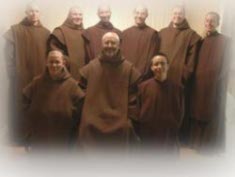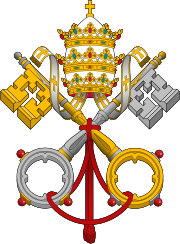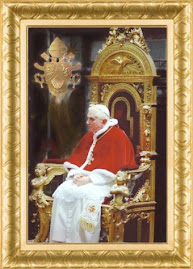 Let us search our ways, and seek, and return to the Lord.
Let us search our ways, and seek, and return to the Lord.
Lamentations 3: 40
By this term is understood a review of one's past thoughts, words and actions for the purpose of ascertaining their conformity with, or difformity from, the moral law. Directly, this examination is concerned only with the will, that is, with the good or bad intention that inspires one's thoughts, words, and actions. Some of the ancient philosophers -- the Stoics in particular -- studied to be blameless in their own sight, and for this they made frequent use of self-inspection. They professed the doctrine that the happiness and dignity of man consist in virtue, or compliance with the law of reason, or with conscience; and thus examinations of conscience were a regular practice in the schools of the Stoics and of their later followers, such Eclectics as Quintus Sextius and Seneca. In the hearts of all men there is heard at times the voice of conscience bidding them seek their moral perfection, not so much for the dignity and happiness it confers on them as through regard for the holiness of the Supreme Author of the moral law. This precept of rational nature has been enforced by the voice of revelation. Thus God said to Abraham, "Walk before me, and be perfect" (Genesis 17:1) To this precept the Prophet Jeremias referred when he sang in his Lamentations: "Let us search our ways, and seek, and return to the Lord" (iii, 40).
In the fullness of time Christ came to perfect the knowledge of the moral law and draw the human heart into closer union with God. Frequent examination of conscience then became more imperative than before. In particular it was commanded by the Apostle St. Paul to be performed by the faithful each time they received Holy Communion: "Let a man prove" -- that is examine -- "himself: and so let him eat of that bread, and drink of the chalice; for he that eateth and drinketh unworthily eateth and drinketh judgment to himself . . . if we would judge ourselves, we should not be judged" (1 Corinthians 11:28-31). And, as the early Christians received Holy communion very frequently, examination of conscience became a familiar exercise of their spiritual life. Thus we read of the great hermit St. Anthony, that he examined his conscience every night, while St. Basil, St. Augustine and St. Bernard, and founders of religious orders generally made the examination of conscience a regular daily exercise of their followers. What was thus enjoined on religious by rule was inculcated upon the faithful at large by the masters of the spiritual life as a most effectual means to advance in virtue.
The devotional examination of conscience is quite distinct from that required as a proximate preparation for sacramental confession. If a Christian judges himself unworthy of receiving the Body of the Lord, he is to make himself worthy by obtaining pardon of his sins; and the means is provided for the purpose by Christ in the power He has given His ministers to remit sins. As discretion is to be used in remitting or retaining sins, the confession of the sinner is necessary and to confess his faults he must examine his conscience with proper diligence. By self-examination he intensifies his contrition and purpose of amendment in preparing for confession, the penitent is strictly to examine his conscience with such diligence as a prudent man ordinarily devotes to important business, but the impossible is not demanded. The more protracted his wanderings have been, the weaker the prodigal may have become to travel back to his Father, and the more help he may need to accomplish the task. When he has made some earnest efforts in this matter, the priest is to lend his assistance to perfect the work; as Vasquez and de Lugo remark, a prudent confessor can accomplish more with most penitents by a few questions than they themselves can by a long examination. Suarez takes notice that the Fathers of the Church have not taught any set system for such examinations. The ordinary method followed in the examination for confession is to consider in succession the Ten Commandments of God, the Commandments of the Church, the Seven Capital Sins, the duties of one's state of life, the nine ways of partaking in the sin of others. For persons who have led uniform life it will often suffice to recall where they have been, the persons with whom they have dealt, the duties or pursuits in which they have been engaged; how they have behaved on ordinary occasions -- as, for instance, when busied in their usual employment on working-days -- and on unusual occasions, such as Sundays and holidays.
As to the daily examination of conscience, two species must be distinguished, the general and the particular. The former aims at the correction of all kinds of faults, the latter at the avoidance of some particular fault or the acquisition of some particular virtue. For the general examination a good method is laid down by St. Ignatius of Loyola in his "Spiritual Exercises". It contains five points. In the first point we thank God for the benefits received; in the second we ask grace to know and correct our faults; in the third we pass in review the successive hours of the day, noting what faults we have committed in deed, word, thought, or omission; in the fourth we ask God's pardon; in the fifth we purpose amendment. Of the particular examination of conscience St. Ignatius is generally considered as the author, or at least as the first who reduced it to system and promoted its practice among the faithful. It concentrates one's attention on some one fault or virtue. On rising in the morning we resolve to avoid a certain fault during the day, or to perform certain acts of particular virtue. About noon we consider how often we have committed that fault, or practised that virtue; we mark the number in a booklet prepared for the purpose, and we renew our resolution for the rest of the day. At night we examine and mark again, and make resolutions for the following day. We thus act like careful businessmen who watch for a while a special portion of their mercantile transactions to see where losses come in or where greater gain may be secured. St. Ignatius further suggests that we impose upon ourselves some penance for every one of the faults committed and that we compare the numbers marked each time with those of the preceding day, the total sum at the end of the week with that of the preceding week, etc.
after Catholic Encyclopedia at www.newadvent.org
The devotional examination of conscience is quite distinct from that required as a proximate preparation for sacramental confession. If a Christian judges himself unworthy of receiving the Body of the Lord, he is to make himself worthy by obtaining pardon of his sins; and the means is provided for the purpose by Christ in the power He has given His ministers to remit sins. As discretion is to be used in remitting or retaining sins, the confession of the sinner is necessary and to confess his faults he must examine his conscience with proper diligence. By self-examination he intensifies his contrition and purpose of amendment in preparing for confession, the penitent is strictly to examine his conscience with such diligence as a prudent man ordinarily devotes to important business, but the impossible is not demanded. The more protracted his wanderings have been, the weaker the prodigal may have become to travel back to his Father, and the more help he may need to accomplish the task. When he has made some earnest efforts in this matter, the priest is to lend his assistance to perfect the work; as Vasquez and de Lugo remark, a prudent confessor can accomplish more with most penitents by a few questions than they themselves can by a long examination. Suarez takes notice that the Fathers of the Church have not taught any set system for such examinations. The ordinary method followed in the examination for confession is to consider in succession the Ten Commandments of God, the Commandments of the Church, the Seven Capital Sins, the duties of one's state of life, the nine ways of partaking in the sin of others. For persons who have led uniform life it will often suffice to recall where they have been, the persons with whom they have dealt, the duties or pursuits in which they have been engaged; how they have behaved on ordinary occasions -- as, for instance, when busied in their usual employment on working-days -- and on unusual occasions, such as Sundays and holidays.
As to the daily examination of conscience, two species must be distinguished, the general and the particular. The former aims at the correction of all kinds of faults, the latter at the avoidance of some particular fault or the acquisition of some particular virtue. For the general examination a good method is laid down by St. Ignatius of Loyola in his "Spiritual Exercises". It contains five points. In the first point we thank God for the benefits received; in the second we ask grace to know and correct our faults; in the third we pass in review the successive hours of the day, noting what faults we have committed in deed, word, thought, or omission; in the fourth we ask God's pardon; in the fifth we purpose amendment. Of the particular examination of conscience St. Ignatius is generally considered as the author, or at least as the first who reduced it to system and promoted its practice among the faithful. It concentrates one's attention on some one fault or virtue. On rising in the morning we resolve to avoid a certain fault during the day, or to perform certain acts of particular virtue. About noon we consider how often we have committed that fault, or practised that virtue; we mark the number in a booklet prepared for the purpose, and we renew our resolution for the rest of the day. At night we examine and mark again, and make resolutions for the following day. We thus act like careful businessmen who watch for a while a special portion of their mercantile transactions to see where losses come in or where greater gain may be secured. St. Ignatius further suggests that we impose upon ourselves some penance for every one of the faults committed and that we compare the numbers marked each time with those of the preceding day, the total sum at the end of the week with that of the preceding week, etc.
after Catholic Encyclopedia at www.newadvent.org
Daily examination of conscience
With regard to God
Do I pray enough, and when I do pray, do I give my full attention and reverence to my prayer?
Am I fully reverent in church? Do I distract others at prayer?
Do I pay proper attention to my daily prayers, even the small ones like Grace before Meals, prayer before class, etc.?
Do I use God's name outside of my prayers?
Are any of the jokes I tell lacking in reverence?
Am I making sufficient effort to get to know God better and give him the proper place in my life?
With regard to others
Am I unkind or cruel to others in thought, word or deed?
Do I harbour dislikes of other people, or envy them for something?
Am I thoughtful enough and helpful and patient with others?
Do I take away people's characters, telling stories, true or false, about them?
If I have taken away a person's character, have I tried to restore it?
Am I really obedient to those over me and the laws they make?
Do I spoil my obedience by being slow, unwilling or sulky about it?
Am I disrespectful towards my parents, elder brothers and sisters, teachers and those to whom I owe respect? Do I talk about them, when they are present or absent?
Do I give bad examples to others in any way?
Am I sufficiently thoughtful to those who need me in a special way - the sick, the old: do I play my part in helping people?
Do I obey the rules and laws of the school, office, country?
With regard to myself
Am I a show-off, conceited and proud?
Am I out for my own ends only - selfish, and sulky when I don't get my own way?
Do I keep myself fully occupied and therefore prevent temptation?
Am I greedy and ungenerous - thoughtless of others?
Am I angry or impatient with others, insufficiently controlled?
Have I deliberately thought or said anything impure or really vulgar?
Have I failed to stop reading something bad for me, or watching unsuitable TV?
Have any of my actions been in the slightest way impure?
Have I joined with others in sin, or given bad example?
Am I truthful in every way, or do I exaggerate to make myself bigger in the eyes of others? Have I cheated in any way, been dishonest?
Have I stolen anything or borrowed without permission?
Have I made restitution for anything I have taken in the past?
Am I a good companion to others?
after http://dilexitprior.blogspot.com/



























